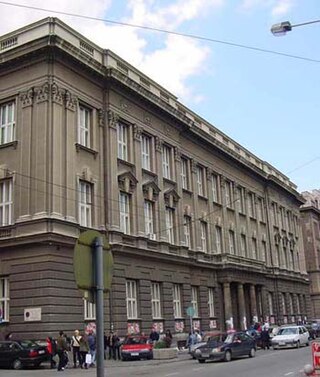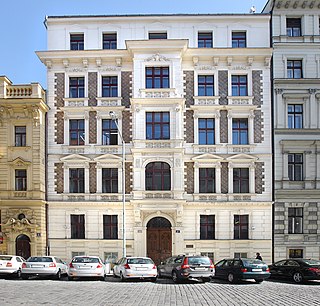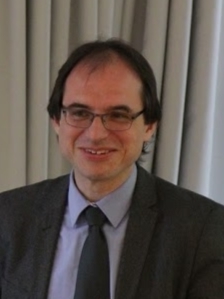Related Research Articles

Charles University, or historically as the University of Prague, is the largest and best-ranked university in the Czech Republic. It is one of the oldest universities in the world in continuous operation, the first university north of the Alps and east of Paris. Today, the university consists of 17 faculties located in Prague, Hradec Králové, and Plzeň.

Karel Čapek was a Czech writer, playwright, critic and journalist. He has become best known for his science fiction, including his novel War with the Newts (1936) and play R.U.R., which introduced the word robot. He also wrote many politically charged works dealing with the social turmoil of his time. Influenced by American pragmatic liberalism, he campaigned in favor of free expression and strongly opposed the rise of both fascism and communism in Europe.

The Czechs, or the Czech people, are a West Slavic ethnic group and a nation native to the Czech Republic in Central Europe, who share a common ancestry, culture, history, and the Czech language.
Slavic or Slavonicstudies, also known as Slavistics, is the academic field of area studies concerned with Slavic peoples, languages, literature, history, and culture. Originally, a Slavist or Slavicist was primarily a linguist or philologist researching Slavistics. Increasingly, historians, social scientists, and other humanists who study Slavic cultures and societies have been included in this rubric.

Pavel Jozef Šafárik was an ethnic Slovak philologist, poet, literary historian, historian and ethnographer in the Kingdom of Hungary. He was one of the first scientific Slavists.

Masaryk University (MU) is the second largest university in the Czech Republic, a member of the Compostela Group and the Utrecht Network. Founded in 1919 in Brno as the second Czech university, it now consists of ten faculties and 35,115 students. It is named after Tomáš Garrigue Masaryk, the first president of an independent Czechoslovakia as well as the leader of the movement for a second Czech university.
European studies is a field of study offered by many academic colleges and universities that focuses on the History of Western civilization and the evolution of Western culture, as well as on current developments in European integration.
German studies is the field of humanities that researches, documents and disseminates German language and literature in both its historic and present forms. Academic departments of German studies often include classes on German culture, German history, and German politics in addition to the language and literature component. Common German names for the field are Germanistik, Deutsche Philologie, and Deutsche Sprachwissenschaft und Literaturwissenschaft. In English, the terms Germanistics or Germanics are sometimes used, but the subject is more often referred to as German studies, German language and literature, or German philology.

Josef Jungmann was a Czech poet and linguist, and a leading figure of the Czech National Revival. Together with Josef Dobrovský, he is considered to be a creator of the modern Czech language. The literary award for the best translation into Czech is named after him.

The Academy of Performing Arts in Prague is a university in the centre of Prague, Czech Republic, specialising in the study of music, dance, drama, film, television and multi-media. It is the largest art school in the Czech Republic, with more than 350 educators and researchers, and 1500 students.

The Czech National Revival was a cultural movement which took place in the Czech lands during the 18th and 19th centuries. The purpose of this movement was to revive the Czech language, culture and national identity. The most prominent figures of the revival movement were Josef Dobrovský and Josef Jungmann.

The Faculty of Arts, Charles University, is one of the original four faculties of Charles University in Prague. When founded, it was named the Faculty of the Liberal Arts or the Artistic Faculty. The faculty provides lectures in the widest range of fields of the humanities in the Czech Republic, and is the only university faculty in Europe which provides studies in all the official languages of the European Union. The faculty has around 1,000 members of staff, over 9,000 students, and a flexible system of more than 700 possible double-subject degree combinations.
Polish studies, Polish philology or Polonistics is the field of humanities that researches, documents and disseminates the Polish language and Polish literature in both historic and present-day forms.

The Faculty of Philology is one of the constituent schools of the University of Belgrade. The school's purpose is to train and educate its students in the academic study or practice in linguistics and philology.

Josef Velenovský was a Czech botanist, mycologist, pteridologist, and bryologist. He also worked with fossils. He was a research investigator and professor in the Botanical Institute of the University of Prague, alternating with his colleague Ladislav Josef Čelakovský. He was also professor of botany at Charles University, where he concentrated in the study of mycology in the final half of his life. Velenovský collected innumerable specimens, particularly in new central Bohemia. He was a prolific author of new fungal species, having formally described about 2700 in his career. Many of his type specimens and other collections are located in the herbarium of the Národní Museum of Prague.

Josef Kodíček was a Czech journalist and theatre critic. During the 1930s, he was a part of the Friday Men circle which used to meet at Karel Čapek's house in Prague.

The Faculty of Social Sciences (FSS) is one of the newest faculties of Charles University. The Faculty was founded in 1990, shortly after the Velvet Revolution. It soon became a regional centre of teaching and research in area studies, economics, international relations, journalism, media studies, sociology and political science. The Faculty offers bachelor's, master's, and doctoral degree programs in social sciences. While the languages of instruction are Czech and English, students can choose from classes in a wide range of other languages, including French, German, Russian and Spanish.
Bohemisms, or Czechisms, are words and expressions borrowed or derived from the Czech language. The former term is derived from the historical name Bohemia for Czech lands.

Stefan Michael Newerkla is an Austrian linguist, Slavist and philologist. He has taught as Professor of West Slavic Linguistics at the University of Vienna since 2004 and has been Full Member (Fellow) of the Austrian Academy of Sciences since 2018.
Bohumila Adamová, known by her pen name Anna Bolavá, is a Czech writer and poet.
References
- ↑ "Centre of Bohemistics and Polonistics - University of Latvia". Archived from the original on 2013-04-13. Retrieved 2013-02-28.
- ↑ Magazine "Bohemistyka"
- ↑ "Home". bohemistika.cz. Archived from the original on 2021-05-18. Retrieved 2022-08-08.